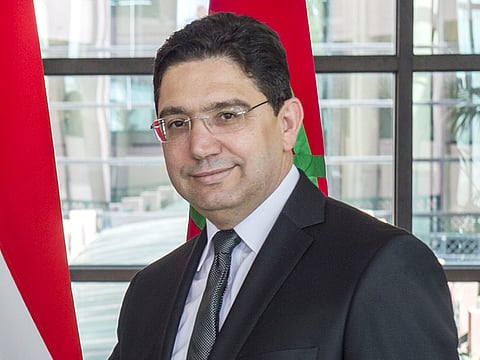Inside story: What led Morocco to cut ties with Iran
Morocco says it has proof the Lebanese Hezbollah provided weapons, training to Polisario separatist fighters

Dubai: Morocco severed diplomatic relations with Iran on Tuesday, accusing it of providing funds, training and weapons to the Polisario Front fighters in the disputed Western Sahara.
Moroccan Foreign Minister Nasser Bourita said he spoke with his Iranian counterpart to officially end ties between the two countries. Morocco's ambassador had already left Tehran.
Bourita said Morocco has obtained proof that the Lebanese Hezbollah, backed by Iran, provided weapons and training to Polisario fighters through the Iranian embassy in Algeria.
Sabri Al Haw, an expert in international law, immigration and the Sahara conflict, speaking to Moroccan daily Hespress, revealed that the Moroccan government based its accusations on a European report issued last month called “Illicit Gun Markets and Firearms Acquisition of Terrorist Networks in Europe”.
According to the report, published by the Flemish Peace Institute, the source from where weapons came was known and, in most cases, from where they are smuggled, sold and used.
Missiles, illicit firearms
A chapter in the report is devoted to “Illicit firearms circulation and the politics of upheaval in North Africa”.
In North Africa, there were three sources: Gaddafi depots, Syria and China and the third was old weapons from old conflicts in North Africa.
Most firearms in the possession of the Polesario originated from outside North Africa, the report stated.
Moroccon investigations lead them to find a heavy presence of Hezbollah officials in Algeria. They were supported by the Iranian embassy.
Missiles including SAM9, SAM22 and Strela (man-portable, shoulder-fired, low-altitude surface-to-air missile system) were given to the Polesario.
Bunkers, tunnels uncovered
They uncovered a network of bunkers and tunnels being built in the Sahara, similar to the ones in Gaza and Syria.
Polesario fighters were also being trained in urban warfare.
Iran and Hezbollah trained and fought different battles across the Middle East, from Lebanon, Iraq, Gaza, Bahrain, Yemen and Syria.
They have a certain pattern of combat, which any analyst and researcher can identify.
They can also tell when Hezbollah are looking for new areas to spread.
Iran on Wednesday denied that it was involved in delivering weapons to the Polisario Front movement.
"Remarks attributed to the foreign minister of Morocco about cooperation between an Iranian diplomat and the Polisario Front in Western Sahara are false,” Iran's foreign ministry said in a statement.
Hezbollah quickly rejected Rabat's accusations, blaming the decision on foreign "pressure".
“It is regrettable that Morocco has resorted to raising these false accusations under US, Israeli and Saudi pressure," Hezbollah said in a statement. “The Moroccan Foreign Ministry should have sought a more convincing pretext to cut ties with Iran," it said in a statement.
The spat comes as tensions have soared between regional powerhouses Iran and Morocco's ally Saudi Arabia.
Riyadh on Wednesday said it "stood by" Rabat's decision to sever ties with Tehran and "strongly condemned the Iranian interference in Morocco's internal affairs".
The UAE Ministry of Foreign Affairs and International Cooperation said that the UAE strongly condemns Iran's intervention in the internal affairs of Morocco through the Hezbollah's terrorist militias, which are training elements of the so-called "Polisario" group in order to destabilise the security and stability in the sisterly Kingdom of Morocco.
Morocco maintains that Western Sahara, a former Spanish colony under its control, is an integral part of the kingdom, while the Polisario Front demands a referendum on self-determination.
Morocco-Tehran relations have been tense since 2009 when Rabat criticized Iran for its efforts to spread Shiism in Morocco, a move the government back then said it was a threat to the country’s moderate Sunni religious identity and such acts could start a civil war like the one in Iraq.
Diplomatic relations were cut down from Ambassador to Chargé d’Affaires since then.
Sign up for the Daily Briefing
Get the latest news and updates straight to your inbox



